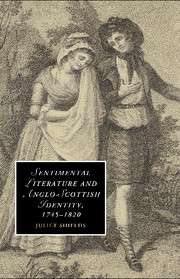Book contents
- Frontmatter
- Contents
- Acknowledgments
- Introduction: The politics and sentiments of union
- 1 The Ossian controversy and the racial beginnings of Britain
- 2 British masculinity and Scottish self-control
- 3 Sentimental correspondences and the boundaries of British identity
- 4 National tales and the domestication of the Scottish Highlands
- 5 Rebellions and re-unions in the historical novel
- Notes
- Bibliography
- Index
- CAMBRIDGE STUDIES IN ROMANTICISM
4 - National tales and the domestication of the Scottish Highlands
Published online by Cambridge University Press: 06 August 2010
- Frontmatter
- Contents
- Acknowledgments
- Introduction: The politics and sentiments of union
- 1 The Ossian controversy and the racial beginnings of Britain
- 2 British masculinity and Scottish self-control
- 3 Sentimental correspondences and the boundaries of British identity
- 4 National tales and the domestication of the Scottish Highlands
- 5 Rebellions and re-unions in the historical novel
- Notes
- Bibliography
- Index
- CAMBRIDGE STUDIES IN ROMANTICISM
Summary
In the 1770s, Humphry Clinker's extensive descriptions of Scotland and Evelina's inclusion of a markedly Scottish character were unusual. By the 1820s the ubiquity of novels about Scotland had become remarkable. Scotch Novel Reading; or Modern Quackery (1824) illustrates the pernicious effects on English readers of the “showers of Scotch novels” with which, according to its author, Sarah Green, England has been “for some years, inundated.” The novel's title page declares it to be written “by a Cockney,” an “anti-Blackwoodian pseudonym” that manifests the author's ideological opposition to the Edinburgh literary culture whence the showers of Scotch novels fell. Claiming to be “really founded on facts,” Scotch Novel Reading charges Scottish novelists with misleading readers through their romantic idealization of a region and a people both of which were in fact poor and uncivilized. Its heroine, Alice, is an avid reader of Scotch novels, who imitates a Scottish dialect, arrays herself in plaid dresses, and longs to marry a Scotsman and retire to the Highlands – until she meets some dirty, impoverished, and ill-mannered Highlanders who quickly cure her diseased imagination. Scotch Novel Reading gives the anxieties concerning sentimental fiction's romanticization of real life a particularly national cast by implying that Scotch novels encourage English readers to indulge in a misguided sympathetic identification that might eventually erode distinctions between Londoners and Highlanders, much to England's detriment.
- Type
- Chapter
- Information
- Sentimental Literature and Anglo-Scottish Identity, 1745–1820 , pp. 110 - 138Publisher: Cambridge University PressPrint publication year: 2010



